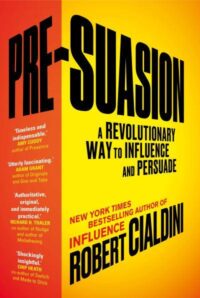Reading Notes for:


The additional (seventh) universal principle of influence: unity. There is a certain type of unity—of identity—that best characterizes a “We” relationship and that, if pre-suasively raised to consciousness, leads to more acceptance, cooperation, liking, help, trust, and, consequently, assent. The chapter describes the first of two main ways to build We relationships: by presenting cues of genetic commonality associated with family and place.
Besides the unitizing effect of being together in the same genealogy or geography, We relationships can result from acting together synchronously or collaboratively. When people act in unitary ways, they become unitized; and when such activity is arranged pre-suasively, it produces mutual liking and support.
Privileged Moments
Its obtuse scientific name is “positive test strategy.” But it comes down to this: in deciding whether a possibility is correct, people typically look for hits rather than misses; for confirmations of the idea rather than for disconfirmations. It is easier to register the presence of something than its absence.
This was the outcome when members of a sample of Canadians were asked either if they were unhappy or happy with their social lives. Those asked if they were unhappy were far more likely to encounter dissatisfactions as they thought about it and, consequently, were 375 percent more likely to declare themselves unhappy.
There are multiple lessons to draw from this finding. First, if a pollster wants to know only whether you are dissatisfied with something—it could be a consumer product or an elected representative or a government policy—watch out. Be suspicious as well of the one who asks only if you are satisfied. Single-chute questions of this sort can get you both to mistake and misstate your position. I’d recommend declining to participate in surveys that employ this biased form of questioning. Much better are those that use two-sided questions: “How satisfied or dissatisfied are you with this brand?” “Are you happy or unhappy with the mayor’s performance in office?”
Decidedly more worrisome than the pollster whose leading questions usher you into a less than accurate personal stance, though, is the questioner who uses this same device to exploit you in that moment—that privileged moment.
I’m convinced that the “Are you un happy?” question is more than a screening device. It’s also a recruiting device that stacks the deck by focusing people, unduly, on their dissatisfactions. (The truth is that cults don’t want malcontents within their ranks; they are looking for basically well-adjusted individuals whose positive, can-do style can be routed to cult pursuits.)
